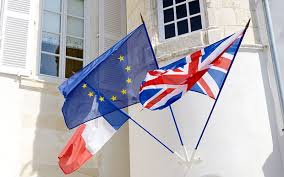Note IVERIS - 18 février, 2016
Note d’actualité
Hajnalka Vincze
Note d’actualité
En 1975, au moment du premier référendum britannique sur la question de savoir si l’Angleterre devait rester ou pas dans ce qui était alors les Communautés européennes, une caricature du Canard enchaîné dessina le Premier ministre Harold Wilson au lit, sur une Europa manifestement ennuyée qui l’implorait : « Entrez ou sortez, mon cher Wilson, mais cessez ce va-et-vient ridicule ». C’était il y a plus de quarante ans… Quatre décennies durant lesquelles l’Angleterre a soigneusement gardé sa position « semi-détachée de l’Europe », pour citer l’ancien Commissaire britannique, Chris Patten...
A en croire l’effervescence actuelle, une éventuelle sortie, par voie référendaire, du Royaume-Uni de l’Union européenne est « le » grand sujet européen et transatlantique de cette année 2016. Le tout-Bruxelles (et le tout-Washington) sont mobilisés pour empêcher le départ de ce partenaire et allié fidèle. Sauf que ce partenaire avait toujours eu comme but de dénaturer le projet européen, et que cet allié n’a de fidélité que pour son seul protecteur américain. De ce point de vue, les Britanniques pourraient partir l’esprit tranquille : L’Europe élargie qu’ils avaient réussi à façonner à leur image est aveuglément ultralibérale et servilement atlantiste.
Paradoxalement, c’est aussi ce qui les retient : l’orientation ainsi prise est tellement contraire aux intérêts européens, que les élites britanniques, dûment encouragées par leurs cousins US, considèrent que pour perpétuer l’œuvre, il leur faut sans relâche veiller au grain. En d’autres termes, il est impératif d’empêcher que l’Europe ne se (re)trouve sous influence française. Dans le domaine économique, comme l’a expliqué le directeur du prestigieux Center for European Reform, Charles Grant, aux parlementaires britanniques: en l’absence de Londres, les Allemands pourraient être « forcés, faute de mieux, de travailler plus étroitement avec les Français, et il existe un risque que les Allemands deviennent moins libre-échangistes ».

La même chose est vraie sur le volet transatlantique : les interventions de responsables US en faveur du statu quo, qui culmineront avec la visite du président Obama à Londres juste avant le référendum, en disent long sur l’importance des Britanniques comme courroie de transmission. Vu de Washington, l’essentiel est d’empêcher que l’Europe ne prenne trop d’indépendance, une direction traditionnellement prônée, encore une fois, par la France. Pour le président des Etats-Unis, la présence britannique dans l’UE « nous donne beaucoup plus de confiance dans l’union transatlantique ». Une union dans laquelle l’Europe tout entière est censée être complémentaire, mais pas autonome de l’Amérique, à l’instar justement du Royaume-Uni.
L’intérêt de l’agitation actuelle autour de l’éventuel départ britannique serait précisément le face-à-face entre ces deux visions, françaises et britannique, de l’Europe. Et surtout, le débat qu’une telle clarification devrait permettre d’engager, indépendamment de l’issue du référendum, sur l’impossibilité d’avancer à 28 et la nécessité de pouvoir s’organiser entre pays qui souhaitent « aller plus vite et plus loin ». Sur ce dernier point, la diplomatie française plaide depuis vingt ans en faveur de « l’intégration différenciée », non pas pour permettre des options à la carte, mais pour y instaurer un vrai noyau dur ou avant-garde.
Le président actuel s'est prononcé, lui aussi, en ce sens. François Hollande a parlé de « l’Europe de la volonté » (autrefois connue sous le nom d’Europe-puissance, dont le porte-étendard a toujours été la France, dans son rôle de gardien du temple) par opposition à « l’Europe de la dilution » (réduite à n’être qu’un simple marché et une appendice de l’Amérique, une vision toujours activement prônée par les Britanniques). Reste à savoir si, à l’heure de la clarification, il y a encore quelqu’un dans le camp de l’Europe politique. La France veut-elle encore une Europe-puissance qui assume à la fois son indépendance et son modèle culturel, social et économique? Ou la présence du Royaume-Uni a surtout servi d’alibi pour dissimuler partout l’abandon des finalités stratégiques?
Paradoxalement, c’est aussi ce qui les retient : l’orientation ainsi prise est tellement contraire aux intérêts européens, que les élites britanniques, dûment encouragées par leurs cousins US, considèrent que pour perpétuer l’œuvre, il leur faut sans relâche veiller au grain. En d’autres termes, il est impératif d’empêcher que l’Europe ne se (re)trouve sous influence française. Dans le domaine économique, comme l’a expliqué le directeur du prestigieux Center for European Reform, Charles Grant, aux parlementaires britanniques: en l’absence de Londres, les Allemands pourraient être « forcés, faute de mieux, de travailler plus étroitement avec les Français, et il existe un risque que les Allemands deviennent moins libre-échangistes ».

La même chose est vraie sur le volet transatlantique : les interventions de responsables US en faveur du statu quo, qui culmineront avec la visite du président Obama à Londres juste avant le référendum, en disent long sur l’importance des Britanniques comme courroie de transmission. Vu de Washington, l’essentiel est d’empêcher que l’Europe ne prenne trop d’indépendance, une direction traditionnellement prônée, encore une fois, par la France. Pour le président des Etats-Unis, la présence britannique dans l’UE « nous donne beaucoup plus de confiance dans l’union transatlantique ». Une union dans laquelle l’Europe tout entière est censée être complémentaire, mais pas autonome de l’Amérique, à l’instar justement du Royaume-Uni.
L’intérêt de l’agitation actuelle autour de l’éventuel départ britannique serait précisément le face-à-face entre ces deux visions, françaises et britannique, de l’Europe. Et surtout, le débat qu’une telle clarification devrait permettre d’engager, indépendamment de l’issue du référendum, sur l’impossibilité d’avancer à 28 et la nécessité de pouvoir s’organiser entre pays qui souhaitent « aller plus vite et plus loin ». Sur ce dernier point, la diplomatie française plaide depuis vingt ans en faveur de « l’intégration différenciée », non pas pour permettre des options à la carte, mais pour y instaurer un vrai noyau dur ou avant-garde.
Le président actuel s'est prononcé, lui aussi, en ce sens. François Hollande a parlé de « l’Europe de la volonté » (autrefois connue sous le nom d’Europe-puissance, dont le porte-étendard a toujours été la France, dans son rôle de gardien du temple) par opposition à « l’Europe de la dilution » (réduite à n’être qu’un simple marché et une appendice de l’Amérique, une vision toujours activement prônée par les Britanniques). Reste à savoir si, à l’heure de la clarification, il y a encore quelqu’un dans le camp de l’Europe politique. La France veut-elle encore une Europe-puissance qui assume à la fois son indépendance et son modèle culturel, social et économique? Ou la présence du Royaume-Uni a surtout servi d’alibi pour dissimuler partout l’abandon des finalités stratégiques?
Tags:
brexit, royaume-uni, ue




















